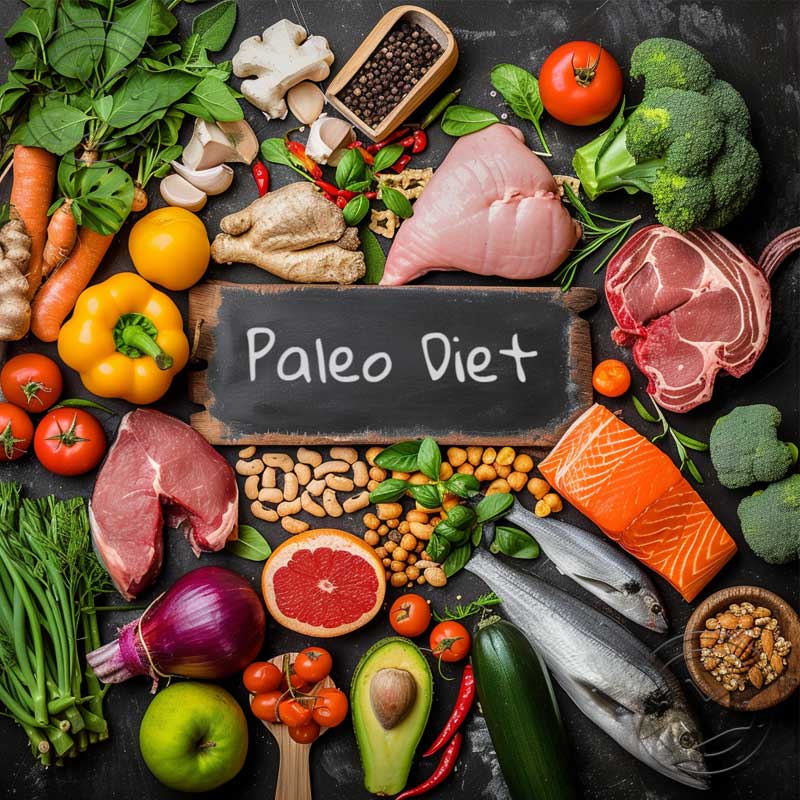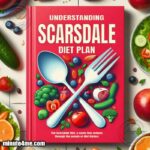Paleo (Paleolithic) Diet
The Paleo diet, also known as the Paleolithic diet or the caveman diet, is a diet based on the foods that were supposedly eaten by humans during the Paleolithic period, which lasted from about 2.5 million years ago to 10,000 years ago.
During the Paleolithic period, humans were hunter-gatherers who ate a diet that was rich in meat, fish, vegetables, fruits, and nuts.
They did not eat dairy products, grains, or processed foods.
The Paleo diet is based on the idea that the human body is best suited for a diet that is similar to the one that our ancestors ate.
Proponents of the Paleo diet believe that eating a diet that is high in protein and low in processed foods can help to improve health and well-being.
The Paleo diet is a popular diet for weight loss, and there is some evidence to suggest that it can be effective for this purpose.
However, there is also some evidence to suggest that the Paleo diet may not be as healthy as other diets, such as the Mediterranean diet.
The Paleo diet is a restrictive diet, and it can be difficult to follow for some people.
Benefits of Paleo Diet
The Paleo diet has been linked to a number of health benefits, including:
- Weight loss. Studies have shown that the Paleo diet can help people lose weight and keep it off.
- Reduced inflammation. The Paleo diet is rich in anti-inflammatory foods, such as fruits, vegetables, and lean protein. This can help to reduce inflammation and improve overall health.
- Improved blood sugar control. The Paleo diet is low in processed carbohydrates, which can help to improve blood sugar control. This is especially important for people with diabetes or prediabetes.
- Reduced risk of heart disease. The Paleo diet is rich in heart-healthy fats, such as omega-3 fatty acids. This can help to reduce cholesterol levels and improve heart health.
- Improved mood. The Paleo diet is rich in nutrients that are essential for brain health, such as B vitamins, iron, and zinc. This can help to improve mood and cognitive function.
Of course, the Paleo diet is not without its risks.
Some people may find it difficult to stick to the diet, and it can be expensive to buy Paleo-friendly foods.
Additionally, the Paleo diet is low in calcium and vitamin D, so it is important to supplement these nutrients if you are following the diet.
Overall, the Paleo diet can be a healthy option for people who are looking to improve their overall health.
Explore the negative effects of the coffee diet, revealing a landscape fraught with peril. Beyond its promise for weight loss,…
Risks of Paleo Diet
The Paleo diet is a popular diet that is based on the idea that humans should eat the same foods that our ancestors ate during the Paleolithic era.
This means that the diet is heavy in meat, fish, vegetables, and fruits, and it excludes processed foods, dairy products, and grains.
While the Paleo diet can be healthy for some people, there are also some risks associated with it.
These risks include:
- Increased risk of nutrient deficiencies. The Paleo diet is low in some nutrients, such as calcium, iron, and vitamin D. This can lead to nutrient deficiencies, which can have a number of negative health consequences.
- Increased risk of kidney stones. The Paleo diet is high in animal protein, which can increase the risk of kidney stones.
- Increased risk of heart disease. The Paleo diet is high in saturated fat, which can increase the risk of heart disease.
- Increased risk of inflammation. The Paleo diet is high in red meat, which can increase inflammation.
- Increased risk of certain types of cancer. The Paleo diet is high in processed meat, which has been linked to an increased risk of certain types of cancer.
It is important to note that these risks are not associated with everyone who follows the Paleo diet.
However, it is important to be aware of these risks before you decide to start the diet.
Paleo Diet Foods
The Paleo diet is based on the premise that the human body is best suited for a diet that is high in protein and low in processed foods.
The diet encourages people to eat whole, unprocessed foods such as meat, fish, fruits, vegetables, and nuts.
Here is a list of foods that are allowed on the Paleo diet:
- Meat: Beef, pork, lamb, venison, bison, elk, and other wild game
- Fish and seafood: Salmon, tuna, shrimp, lobster, and other shellfish
- Fruits: Berries, apples, pears, bananas, and other fruits
- Vegetables: Leafy greens, broccoli, cauliflower, carrots, and other vegetables
- Nuts and seeds: Almonds, walnuts, pecans, and other nuts
- Healthy oils: Olive oil, coconut oil, avocado oil, and other healthy oils
Here is a list of foods that are not allowed on the Paleo diet:
- Grains: Wheat, rice, oats, corn, and other grains
- Dairy products: Milk, cheese, yogurt, and other dairy products
- Legumes: Beans, peas, lentils, and other legumes
- Processed foods: Sugar, processed meats, refined oils, and other processed foods
The Paleo diet is a healthy and nutritious diet that can provide many benefits for people of all ages.
Scarsdale Diet Explained: What You Need to Know
Discover the enigmatic allure of the Scarsdale Diet – a time-honored weight loss legend that promises transformative results in just…
Paleo Diet Meal Plan
Here is a sample Paleo diet meal plan for one week:
Monday
- Breakfast: Omelet with 2 eggs, 1/2 cup spinach, 1/4 cup mushrooms, and 1/4 cup tomatoes
- Lunch: Salad with grilled chicken breast, sliced avocado, tomatoes, cucumber, and red onion
- Dinner: Salmon fillet with roasted vegetables (broccoli, carrots, and sweet potatoes)
Tuesday
- Breakfast: Yogurt with berries, nuts, and seeds
- Lunch: Leftover salmon salad
- Dinner: Beef stew with roasted potatoes and carrots
Wednesday
- Breakfast: Hard-boiled eggs with avocado and tomato slices
- Lunch: Turkey burger on a lettuce wrap with grilled vegetables
- Dinner: Chicken thighs with roasted sweet potatoes and asparagus
Thursday
- Breakfast: Scrambled eggs with bacon and vegetables
- Lunch: Salad with grilled salmon, avocado, tomatoes, cucumber, and red onion
- Dinner: Pork chops with roasted vegetables (broccoli, carrots, and sweet potatoes)
Friday
- Breakfast: Omelet with 2 eggs, 1/2 cup spinach, 1/4 cup mushrooms, and 1/4 cup tomatoes
- Lunch: Leftover pork chops with roasted vegetables
- Dinner: Fish tacos with grilled fish, vegetables, and guacamole
Saturday
- Breakfast: Yogurt with berries, nuts, and seeds
- Lunch: Salad with grilled chicken breast, sliced avocado, tomatoes, cucumber, and red onion
- Dinner: Steak with roasted vegetables (broccoli, carrots, and sweet potatoes)
Sunday
- Breakfast: Hard-boiled eggs with avocado and tomato slices
- Lunch: Leftover steak with roasted vegetables
- Dinner: Chicken thighs with roasted sweet potatoes and asparagus
Paleo Diet Shopping List
- Meats: Beef, lamb, pork, chicken, turkey, fish, seafood, and organ meats
- Vegetables: Leafy greens, cruciferous vegetables, root vegetables, squashes, and tomatoes
- Fruits: Berries, melons, apples, pears, and bananas
- Nuts and seeds: Almonds, walnuts, pecans, macadamia nuts, sunflower seeds, and pumpkin seeds
- Healthy fats: Olive oil, avocado oil, coconut oil, ghee, and butter
- Spices and herbs: Garlic, onion, ginger, turmeric, cinnamon, and rosemary
Are you looking for a healthy and delicious diet that is easy to follow? If so, the Danish diet may…
Paleo Diet Supplements
The Paleo diet is a diet that is based on the foods that were eaten by humans during the Paleolithic era, which is also known as the Stone Age.
This diet is typically high in protein and low in carbohydrates, and it emphasizes whole foods such as fruits, vegetables, nuts, seeds, and meat.
While the Paleo diet is generally considered to be healthy, there are some nutrients that may be lacking in this diet.
For this reason, some people who follow the Paleo diet choose to take supplements in order to ensure that they are getting all of the nutrients that they need.
The following is a list of some of the most common supplements that are used by people who follow the Paleo diet:
- Vitamin D: Vitamin D is a fat-soluble vitamin that is essential for bone health. It is also important for immune function and the absorption of calcium. The Paleo diet is typically low in vitamin D, so it is important to get enough of this vitamin from other sources, such as supplements.
- Omega-3 fatty acids: Omega-3 fatty acids are a type of polyunsaturated fat that is essential for good health. They are found in fish, seafood, and some plant sources. The Paleo diet is typically low in omega-3 fatty acids, so it is important to get enough of this nutrient from other sources, such as supplements.
- Iron: Iron is an essential mineral that is needed for red blood cell production. The Paleo diet is typically low in iron, so it is important to get enough of this mineral from other sources, such as supplements.
- Zinc: Zinc is an essential mineral that is involved in many different bodily functions, including immune function and wound healing. The Paleo diet is typically low in zinc, so it is important to get enough of this mineral from other sources, such as supplements.
It is important to note that supplements should not be used as a substitute for a healthy diet.
The best way to get the nutrients that you need is to eat a variety of whole foods.
However, if you are concerned that you may be deficient in certain nutrients, you may want to talk to your doctor about taking supplements.
Conclusion
The Paleo diet is a popular diet that is based on the foods that were eaten by humans during the Paleolithic period.
- The Paleo diet is high in protein and low in carbohydrates.
- The Paleo diet is rich in fruits, vegetables, and lean meats.
- The Paleo diet is free of processed foods, refined sugar, and unhealthy fats.
There are many potential benefits of following the Paleo diet, including weight loss, improved blood sugar control, and reduced inflammation.
- The Paleo diet can help you lose weight and keep it off.
- The Paleo diet can help improve your blood sugar control.
- The Paleo diet can help reduce inflammation.
However, there are also some risks associated with following the Paleo diet, including nutrient deficiencies and potential health complications.
- The Paleo diet can lead to nutrient deficiencies, such as vitamin B12 and iron deficiency.
- The Paleo diet can increase your risk of heart disease and stroke.
Overall, the Paleo diet is a healthy diet that can provide many benefits.






